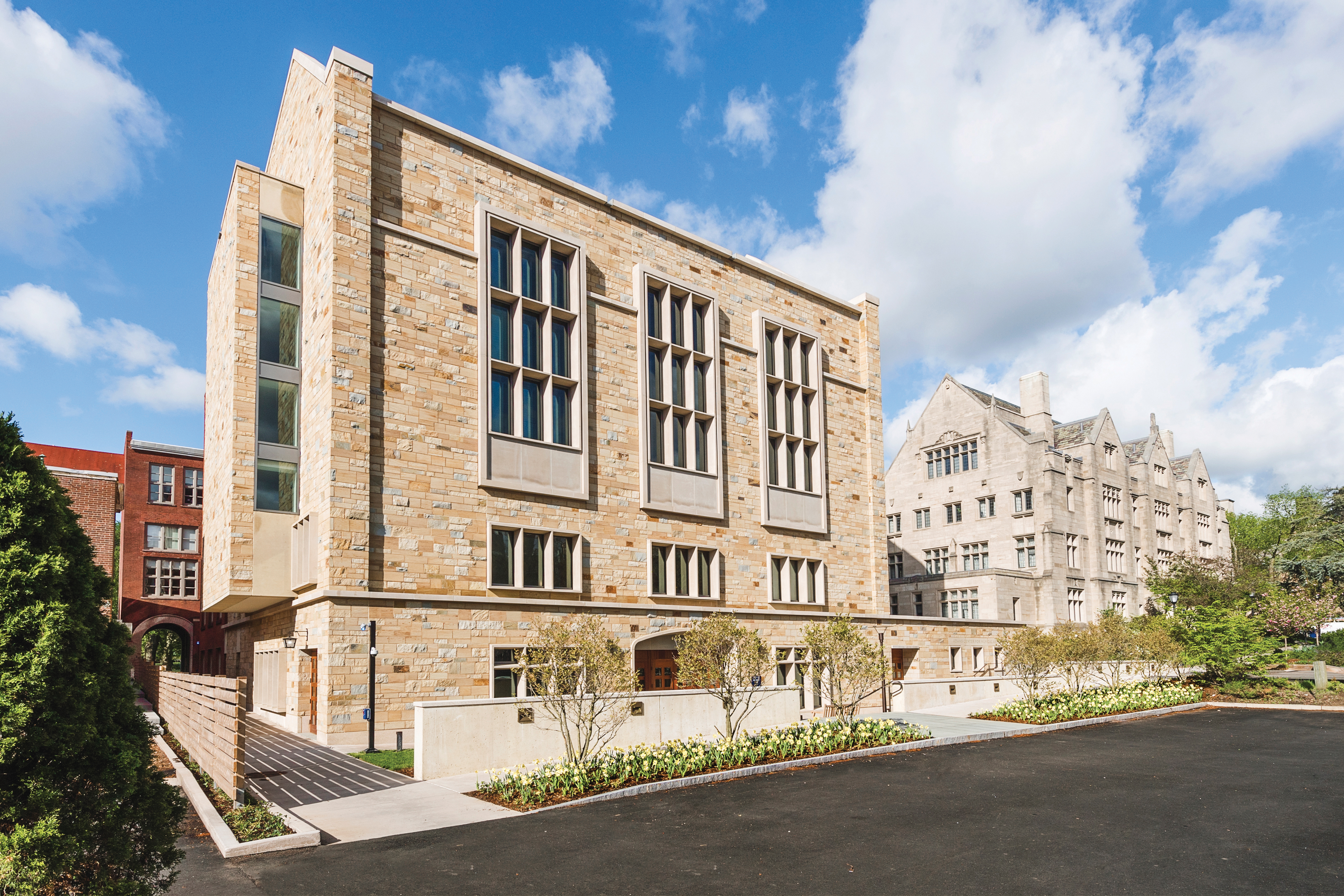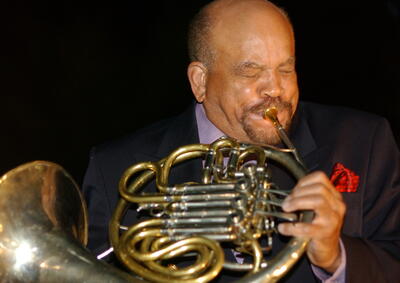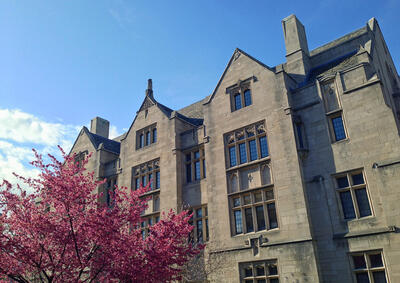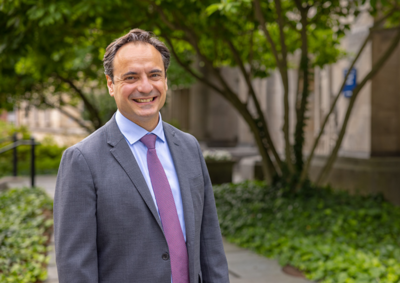About the Yale School of Music
At the Yale School of Music, we prepare exceptional students for service to the profession and to society.
The School fosters a vibrant musical environment where graduate-level performers and composers realize their highest artistic potential with an internationally distinguished faculty.
In preparing students for roles as cultural leaders, the School engages with the University’s intellectual and technological resources and collaborates with artistic centers throughout the world.
History and Leadership
Leadership and Board of Advisors
The Yale School of Music is led by the University’s Henry and Lucy Moses Dean of Music, José García-León. He receives guidance from the School’s Board of Advisors.
José García-León, Henry and Lucy Moses Dean of Music
Paul Berry, Interim Deputy Dean
Board of Advisors
Kent R. Adams, A.B., M.B.A.
Halina D. Avery, B.M., M.M., M.B.A.
Frederick W. Beinecke, B.A., J.D.
Nancy Marx Better, B.A.
Mary Beth Buck, B.A.
Walter H. Buck, B.A., M.B.A.
Helen Chung-Halpern, B.A., M.B.A.
Jamie Brooke Forseth, B.M., B.A., M.A., M.B.A.
Daniel T. Gien, B.S., M.M., M.B.A., J.D.
Alexander Glantz, B.A., M.B.A.
Carol Colburn Grigor, C.B.E., B.M., M.M.A.
Abel G. Halpern, B.A., M.B.A.
Stephen Hendel, B.A., J.D.
John A. Herrmann, Jr., B.A., M.B.A.
Elinor L. Hoover, B.A., M.B.A.
David M. Kurtz, B.A., M.M.
Seunghee Lee, B.M., M.M., A.D.
Stephanie Yu Lim, B.A., J.D.
Joanne Lipman, B.A.
David Low, A.B., M.P.P.M.
Sylvia P. Marx, B.A., M.Ed.
Eugene A. Pinover, B.A., J.D.
Jean Eric Salata, B.S.
Melanie Salata, B.A., M.A.
Anne-Marie Soullière, B.A., M.B.A.
Timothy A. Steinert, B.A., J.D.
Honorary
Denise Adams, B.A., M.F.A.
Stephen Adams, B.A., M.B.A.
Lester S. Morse, Jr., B.A., M.B.A.
History of YSM
1854: Joseph Battell gives $5,000 to Yale College “for the support, as far as it may go, of a teacher of the science of music to such students as may avail themselves the opportunity.”
1855: The Yale Corporation approves the appointment of Gustave Jacob Stoeckel as an instructor in church music and the singing director of the Chapel Choir and other musical activities at Yale College.
1889: The Yale Corporation creates a department of music, thanks to an extended campaign by Mr. Stoeckel.
1890: Gustave Jacob Stoeckel is appointed Battell Professor of Music, making him the university’s first music professor. Yale offers its first credited courses in music.
1894: Yale’s first Bachelor of Music degrees are awarded to a class of four. Gustave Stoeckel retires, and two new teachers are appointed to succeed him: Samuel Simons Sanford as Professor of Applied Music and Horatio Parker as Battell Professor of the Theory of Music. The Yale School of Music is established, thanks to the efforts of Professor Sanford.
1900: The Yale Collection of Musical Instruments is established with the donation of Morris Steinert’s collection of keyboards and other instruments.
1901: Woolsey Hall is built to celebrate the bicentennial of Yale University.
1902: The Newberry Memorial Organ is built in Woolsey Hall. The organ is renovated and expanded in 1915 and 1928.
1904: Horatio Parker is given the title of Dean of the School of Music.
1917: The School gets a new building: Albert Arnold Sprague Memorial Hall is constructed through the generosity of Mrs. Sprague and her daughter, Elizabeth Sprague Coolidge. The entire School was housed here: studios, practice rooms, library, offices, and an auditorium.
1919: Horatio Parker dies. David Stanley Smith becomes the new Dean and serves until 1940.
1932: The School’s graduate division is established, and Yale awards its first Master of Music degree.
1939: The Yale Summer School of Music/Norfolk Chamber Music Festival is established with a legacy gift from Ellen Battell Stoeckel.
1940: German exile composer Paul Hindemith joins the faculty.
1941: Bruce Simonds begins his 13-year term as Dean. The Yale Collegium Muscium is established to study early music.
1953: Hindemith leaves Yale and returns to Europe.
1954: Luther Noss, a member of the faculty since 1939, becomes Dean. Sprague Hall is renovated to accommodate the School’s rapidly growing library. The School of Music acquires York Hall to meet the need for additional studio facilities and administrative offices. York Hall is renovated and renamed Stoeckel Hall in honor of Yale’s first instructor in music.
1958: The School becomes a graduate professional school exclusively, requiring an undergraduate degree for admission and conferring only the Master of Music degree.
1961: The Yale Collection of Musical Instruments moves to its current home at 15 Hillhouse Avenue.
1968: The Schools adds new graduate programs, leading to the Master of Musical Arts and Doctor of Musical Arts degrees.
1970: Musicologist Philip Nelson serves at Dean through 1980.
1973: The Yale Institute of Sacred Music, an interdisciplinary graduate center for the study of music, liturgy, and the arts, is established. The School’s orchestra becomes known as the Philharmonia Orchestra of Yale, and Otto-Werner Mueller becomes the orchestra’s resident conductor. Polish composer Krzysztof Penderecki joins the faculty, teaching at Yale for six years.
1976: The Tokyo String Quartet joins the faculty as artists-in-residence.
1980: Frank Tirro, a musicologist and early music specialist who had been chair of the Department of Music at Duke University, is appointed Dean.
1983: Aldo Parisot establishes the Yale Cellos. The ensemble goes on to earn a Grammy nomination and perform in France, England, and Korea.
1989: American composer Ezra Laderman becomes Dean.
1995: Pianist Robert Blocker joins the Yale administration as Dean of the School of Music.
1997: The Yale Percussion Group is established under the direction of Robert van Sice.
1998: The music library reopens in its new home within Sterling Memorial Library and is now known as the Irving S. Gilmore Music Library.
2003: Sprague Memorial Hall reopens after extensive renovations, revealing a refurbished Morse Recital Hall and outfitted with a new recording studio, Center for Studies in Music Technology, and Smart Classroom.
2005: Stephen Adams ’59BA and Denise Adams make a transformative gift of $100 million, enabling the School to expand academic programs and give full-tuition scholarships to all students.
2006: Renovations are completed on the building at 435 College Street, which reopens as Leigh Hall and houses faculty studios, classrooms, and offices.
2007: The Yale in New York concert series begins presenting concerts at Carnegie Hall and other New York City venues.
2008: The Yale Philharmonia makes its first tour of Asia, with performances in Seoul, Beijing, and Shanghai.
2013: The Tokyo String Quartet retires from the international concert stage and from its longtime residency at Yale. The Brentano String Quartet is appointed as the new Quartet-in-Residence.
2015: A major construction and renovation project begins on Hendrie Hall, which will reopen as the Adams Center for Musical Arts.
2017: The Adams Center for Musical Arts, a new complex that links the newly renovated Hendrie Hall with the previously renovated Leigh Hall, opens for use at the start of the spring semester. A grand-opening ceremony is held on February 16, 2017.
2023: Robert Blocker retires after 28 years as Dean and José García-León is named the Henry and Lucy Moses Dean of the Yale School of Music.






